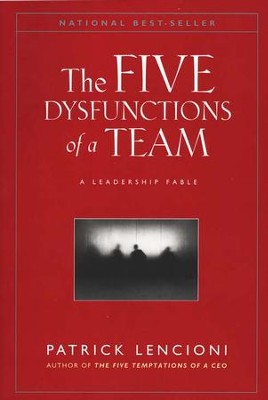Favorite Books
The Five Dysfunctions of a Team, by Patrick Lencioni
Although 20 years old, this is still the definitive text on what it takes for teams to work more effectively together. I love using this book with leadership teams to take their performance to the next level!
The Six Types of Working Genius, by Patrick Lencioni
A simple but powerful Energy (rather than Competency) based assessment. The survey will help you understand yourself and others better. It is also a powerful business tool to guide teams through the six phases of work. I use this with leaders and their teams to build trust, improve results, and make work more FUN.
The Ideal Team Player, by Patrick Lencioni
Although this book came after “The Five Dysfunctions”, it could have been a precursor. Patrick and his team at the Table Group identify the attributes of an Ideal Team Player. Without strong players, achieving team cohesiveness will be that much harder.
Getting Naked, by Patrick Lencioni
Serve, Don’t Sell. In this book, Patrick Lencioni talks directly to consultants and service providers. He promotes the idea that clients want consultants to be “naked” – transparent, servant-oriented, and more interested in adding value to the client’s business than they are in the money being paid. Make it about the client and their concerns, not about the consultant.
The Coaching Habit, Michael Bungay Stanier
Michael is often rated among the top 10 Leadership coaches worldwide. This is an amazing formula to help you do what many leaders never learn – ask questions, then shut up and listen to the answers. Michael shares seven simple questions to get to the real issues and solve the real problems. I highly recommend this for coaches and leaders everywhere.
The Advice Trap, Michael Bungay Stanier
As leaders, we want to be good coaches, but coaching doesn’t come naturally. The Advice Trap gets to the core of coaching: be humble and stay curious. Resist the urge to deliver advice, but instead ask good questions. This should have probably come before Coaching Habits, but both deliver.
Think Again, by Adam Grant
In Think Again, Adam Grant weaves together research and storytelling to help us build the intellectual and emotional muscle we need to stay curious enough about the world to actually change it. “I’ve never felt so hopeful about what I don’t know.” Brené Brown, PhD
Start with Why, by Simon Sinek
Over a decade ago, Simon Sinek started a movement that inspired millions to demand purpose at work, to ask what was the “why” of their organization. Start with Why asks (and answers) the questions: Why are some people and organizations more innovative, more influential, and more profitable than others?
Leaders Eat Last, by Simon Sinek
The Infinite Game, by Simon Sinek
True North, by Bill George
As someone who worked at Medtronic during Bill’s tenure, I saw firsthand how his approach inspired leaders and produced unprecedented growth. In True North: Emerging Leaders Edition, renowned leadership expert Bill George and Millennial tech entrepreneur Zach Clayton issue the challenge to emerging leaders—from Gen X to Millennials and Gen Z—to lead their organizations authentically through never-ending crises to make this world a better place for everyone.
Atomic Habits, by James Clear
We all have habits we’d like to break and habits we’d like to adopt. Atomic Habits lays out a simple yet powerful construct to get you where you want to go. What makes this different is that it starts with setting a specific intent and then making very small changes to build the evidence that you are who you want to be. I have benefited substantially from this book.
Reality-Based Leadership, Cy Wakeman
Cy describes the kind of no-nonsense leader who changes the way people think about and perceive their circumstances – one who deals with the facts, clarifies roles, gives clear and direct feedback, and insists that everyone do the same – without drama or defensiveness. She asks “What does great look like from here?” I think we could all benefit from a little more of her forward focus.













